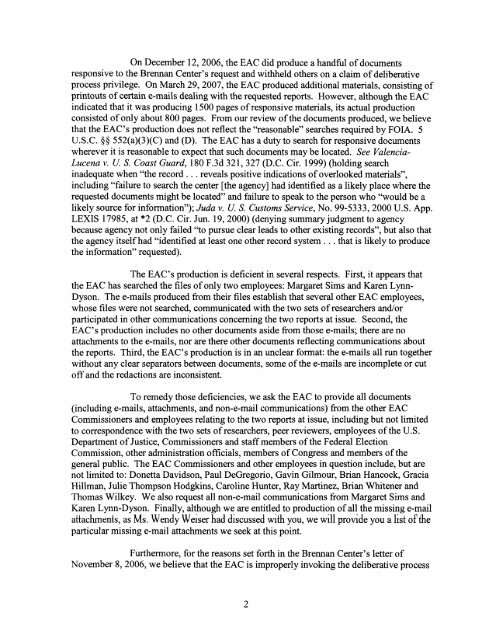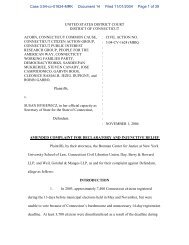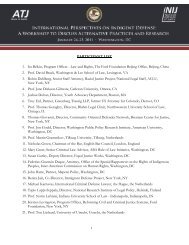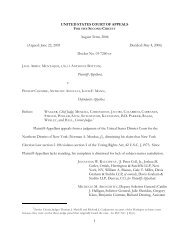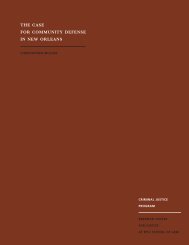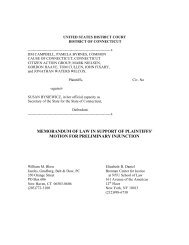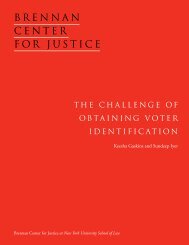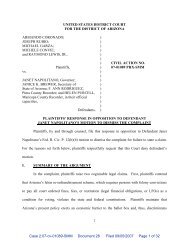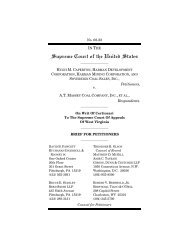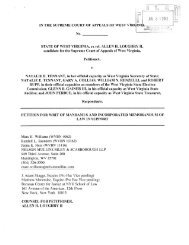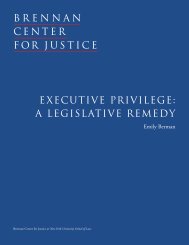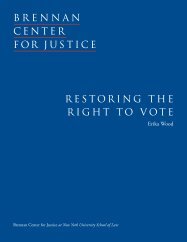CRAVATH, SWAINE & MOORE LLP
CRAVATH, SWAINE & MOORE LLP
CRAVATH, SWAINE & MOORE LLP
You also want an ePaper? Increase the reach of your titles
YUMPU automatically turns print PDFs into web optimized ePapers that Google loves.
On December 12, 2006, the EAC did produce a handful of documents<br />
responsive to the Brennan Center's request and withheld others on a claim of deliberative<br />
process privilege. On March 29, 2007, the EAC produced additional materials, consisting of<br />
printouts of certain e-mails dealing with the requested reports. However, although the EAC<br />
indicated that it was producing 1500 pages of responsive materials, its actual production<br />
consisted of only about 800 pages. From our review of the documents produced, we believe<br />
that the EAC's production does not reflect the "reasonable" searches required by FOIA. 5<br />
U.S.C. §§ 552(a)(3)(C) and (D). The EAC has a duty to search for responsive documents<br />
wherever it is reasonable to expect that such documents may be located. See Valencia-<br />
Lucena v. U. S. Coast Guard, 180 F.3d 321, 327 (D.C. Cir. 1999) (holding search<br />
inadequate when "the record ... reveals positive indications of overlooked materials",<br />
including "failure to search the center [the agency] had identified as a likely place where the<br />
requested documents might be located" and failure to speak to the person who "would be a<br />
likely source for information"); Juda v. U. S. Customs Service, No. 99-5333, 2000 U.S. App.<br />
LEXIS 17985, at *2 (D.C. Cir. Jun. 19, 2000) (denying summary judgment to agency<br />
because agency not only failed "to pursue clear leads to other existing records", but also that<br />
the agency itself had "identified at least one other record system ... that is likely to produce<br />
the information" requested).<br />
The EAC's production is deficient in several respects. First, it appears that<br />
the EAC has searched the files of only two employees: Margaret Sims and Karen Lynn-<br />
Dyson. The e-mails produced from their files establish that several other EAC employees,<br />
whose files were not searched, communicated with the two sets of researchers and/or<br />
participated in other communications concerning the two reports at issue. Second, the<br />
EAC's production includes no other documents aside from those e-mails; there are no<br />
attachments to the e-mails, nor are there other documents reflecting communications about<br />
the reports. Third, the EAC's production is in an unclear format: the e-mails all run together<br />
without any clear separators between documents, some of the e-mails are incomplete or cut<br />
off and the redactions are inconsistent.<br />
To remedy those deficiencies, we ask the EAC to provide all documents<br />
(including e-mails, attachments, and non-e-mail communications) from the other EAC<br />
Commissioners and employees relating to the two reports at issue, including but not limited<br />
to correspondence with the two sets of researchers, peer reviewers, employees of the U.S.<br />
Department of Justice, Commissioners and staff members of the Federal Election<br />
Commission, other administration officials, members of Congress and members of the<br />
general public. The EAC Commissioners and other employees in question include, but are<br />
not limited to: Donetta Davidson, Paul DeGregorio, Gavin Gilmour, Brian Hancock, Gracia<br />
Hillman, Julie Thompson Hodgkins, Caroline Hunter, Ray Martinez, Brian Whitener and<br />
Thomas Wilkey. We also request all non-e-mail communications from Margaret Sims and<br />
Karen Lynn-Dyson. Finally, although we are entitled to production of all the missing e-mail<br />
attachments, as Ms. Wendy Weiser had discussed with you, we will provide you a list of the<br />
particular missing e-mail attachments we seek at this point.<br />
Furthermore, for the reasons set forth in the Brennan Center's letter of<br />
November 8, 2006, we believe that the EAC is improperly invoking the deliberative process


